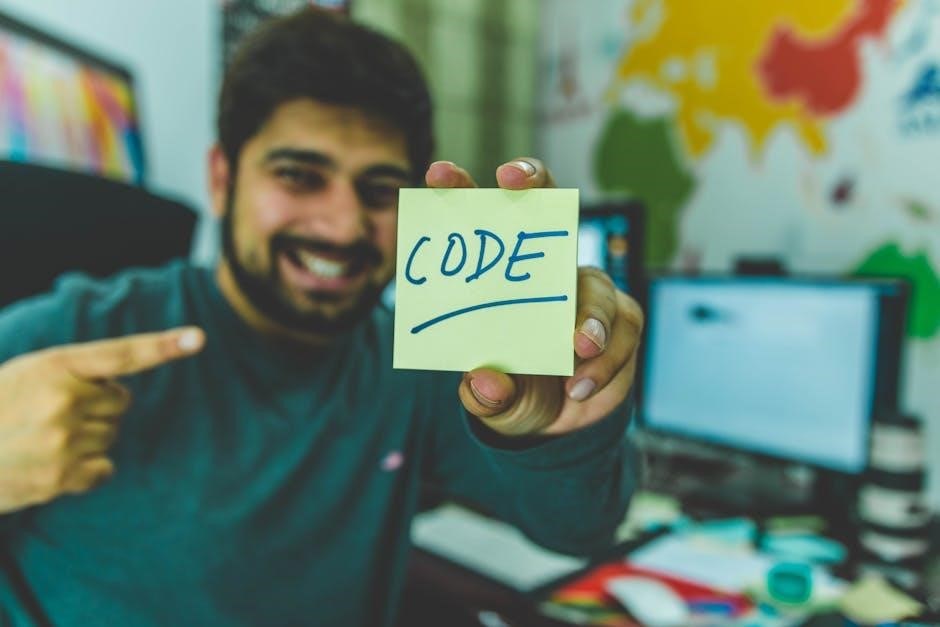Computer programming is an essential skill in today’s digital world, enabling individuals to create software, apps, and tools. Resources like Beginning Programming For Dummies and C Programming For Dummies provide accessible guides for newcomers, simplifying complex concepts into manageable lessons.

What is Computer Programming?
Computer programming is the process of designing, writing, testing, and maintaining the source code of computer programs. It involves instructing a computer to perform specific tasks by following a set of logical steps. Programming is essentially communication between humans and computers, where the programmer writes code in a programming language that the computer can understand and execute.
At its core, programming revolves around solving problems and automating tasks. It requires creativity, logical thinking, and attention to detail. Whether it’s developing a simple calculator or a complex game, programming enables individuals to bring their ideas to life. The process often involves variables, data types, operators, and control structures, which are fundamental building blocks of any program.
Resources like Beginning Programming For Dummies and C Programming For Dummies provide step-by-step guides for newcomers, breaking down complex concepts into easy-to-understand lessons. These resources emphasize the importance of practice and experimentation, encouraging learners to write their first programs and gradually build more sophisticated applications.
Programming is not just about coding; it’s about understanding how computers think and leveraging that knowledge to create innovative solutions. By mastering programming, individuals can unlock a world of possibilities in technology, from building websites to developing artificial intelligence systems.

Why Learn Computer Programming?
Learning computer programming is an invaluable skill in today’s technology-driven world. It opens doors to countless career opportunities, enhances problem-solving abilities, and fosters creativity. Programming allows individuals to bring their ideas to life, whether it’s creating apps, games, or innovative solutions for real-world challenges.
In a rapidly evolving digital landscape, programming skills are highly sought after by employers. Proficiency in programming can lead to lucrative careers in software development, web design, data analysis, and more. Additionally, programming teaches logical thinking and attention to detail, which are beneficial in various aspects of life.
For beginners, resources like Beginning Programming For Dummies and C Programming For Dummies provide a gentle learning curve. These guides simplify complex concepts, making programming accessible to everyone. By learning to code, individuals gain the power to automate tasks, analyze data, and create tools that simplify daily life.

Ultimately, programming is not just about writing code; it’s about solving problems and expressing creativity. Whether you’re a student, a professional, or a hobbyist, learning to program can empower you to achieve your goals and stay competitive in a tech-savvy world.

The Basics of Programming
Programming fundamentals include variables, data types, operators, and control structures. These building blocks help create logical workflows and decision-making processes in code. Understanding them is crucial for writing efficient and effective programs, as emphasized in resources like Beginning Programming For Dummies.

Variables and Data Types
Variables are containers that store values, allowing data manipulation within programs. Data types determine the kind of value a variable can hold, such as integers, strings, or booleans. Beginning Programming For Dummies explains how to declare and use variables efficiently, ensuring proper data handling and reducing errors. Understanding data types is foundational for writing clear and functional code.
Operators and Control Structures
Operators are symbols used to perform operations, such as arithmetic (e.g., +, -, *) or comparison (e.g., ==, <, >). Control structures, like if-else statements and loops, regulate program flow. Programming for Dummies resources guide learners through these concepts, emphasizing practical examples to illustrate their use. Mastering operators and control structures is crucial for creating dynamic and responsive applications.


Choosing the Right Programming Language
Selecting a programming language depends on your goals and experience. Resources like Beginning Programming For Dummies suggest starting with languages like Python or JavaScript, which are versatile and beginner-friendly. These guides help you choose the best language for your needs, ensuring a smooth learning experience.

Popular Programming Languages for Beginners
For newcomers to computer programming, certain languages stand out as ideal starting points. Python, known for its simplicity and readability, is often recommended in guides like Beginning Programming with Python For Dummies. Its intuitive syntax makes it easier for beginners to grasp fundamental concepts quickly. Another popular choice is JavaScript, which is not only used for web development but also for creating desktop and mobile applications. Resources such as JavaScript For Dummies provide comprehensive tutorials tailored for those new to programming.
In addition, languages like BASIC and C are frequently introduced in introductory books. BASIC, with its straightforward structure, is great for understanding the basics of programming logic. C, while more complex, is foundational for understanding how computers process information. Books like C For Dummies break down these languages into digestible parts, making them accessible to learners of all levels.
These languages are widely supported by educational materials, ensuring that beginners have ample resources to learn and practice. By starting with these popular languages, new programmers can build a solid foundation and gradually explore more advanced topics in computer programming.
How to Select a Language That Fits Your Needs
Selecting the right programming language depends on your goals, interests, and the type of projects you want to undertake. Resources like Beginning Programming For Dummies suggest starting by identifying what you want to achieve, whether it’s web development, mobile apps, game design, or data analysis. For example, Python is ideal for beginners interested in data science or artificial intelligence, while JavaScript is perfect for web-based projects.
Consider the language’s simplicity and versatility. Languages like Python and BASIC are great for newcomers because of their straightforward syntax and forgiving nature. On the other hand, C is more challenging but offers a deeper understanding of computer operations. Books like C For Dummies and JavaScript For Dummies provide step-by-step guidance to help learners choose the right path.
Additionally, think about career opportunities and community support. Popular languages like Java and Python have large communities and extensive libraries, making it easier to find help and resources. Ultimately, the best language is one that aligns with your interests and goals, ensuring a enjoyable and productive learning experience.